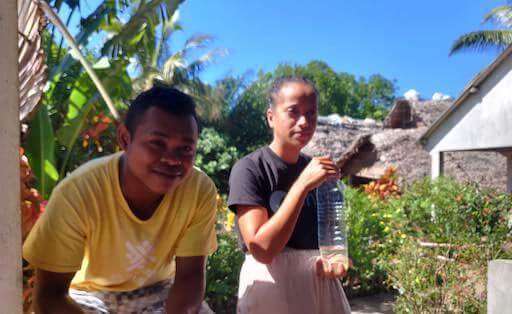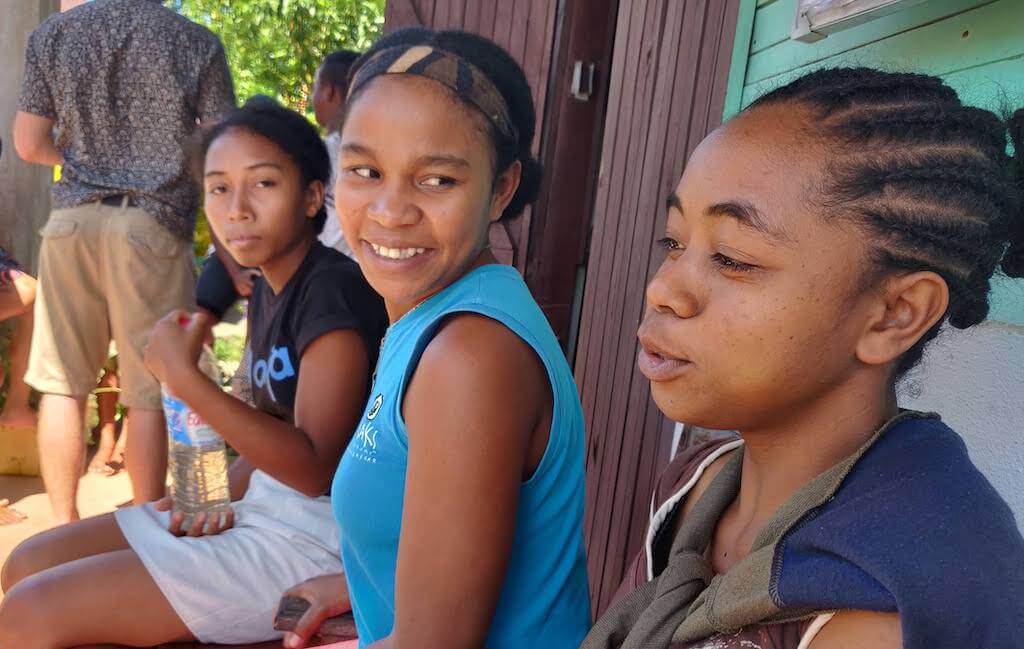Tea-time topics
Every day the class breaks at 10am for tea. But it's not just tea, it's an opportunity for the students to practice their pronounciation.
And rather than drilling on a repetitive speech exercise, Sam and Mitantsoa set a contentious topic for the day that the students are encouraged to talk over.

The topics have been intense, some even eliciting awkward responses, but overall the ones I've listened in on have been a wonderful study. It's a great way to get to know the students and Malagasy culture as a whole.
Topic preparation
These topics aren't decided on at the spur of the moment, rather we gather, condense, and then select the topic for the day.
Mitantsoa, Sam, and I start off with adding topic ideas in a pool of topics. Sometimes the topics are spawned off the subject nuances in English literature, or off topical news, or casual chats we'll have as a group over meals.
This pool of topics is then filtered and adjusted by each one of us, ad hoc, and then passes through to a scheduled list of topics.
What have we chatted about?
Some of the topics include:
- In the absence of Evil, are there varying degrees of Good? Does the reverse apply too?
- What’s the difference between facts and opinions? What is truth?
- Schools kill creativity. What do you think?
- Are beliefs and superstitions the same thing?
- Is there intelligent life out there in the universe other than on Earth? What do the potential answers to that question say about us?
- If you could live forever, would you? Why, or why not?
- You have inherited an alien device that allows you to travel to any time in history. What would you do with it?
- Imagine there’s an isolated and secretive community where all the occupants share their thoughts and feelings without restrictions as if their brains were connected. Would you join this community given the option, considering that the option is not reversible?
- In a future of limited resources and a worsening climate, is it ethical to have children?
- Is there an afterlife?
- Do you agree that money is the root of all evil?
- Do you think Communism is a good thing?
- Some people know how to use the money to improve their lives while some don't. Do you agree?
- Do you agree or disagree with the following statement?
People should sometimes do things that they do not enjoy doing
- A zoo has no useful purpose. Do you agree?
- What is a crime of passion? Can you understand why feelings could cause someone to commit a crime?
- People are quick to forget the good things done for them. Do you agree? Can you think of a time someone did this to you? Can you think of a time when you may have done this to others?
- It's easier to criticise others than to criticise yourself. Do you agree?
Get rich or die trying
. What do you think about this? Do you know people who might subscribe to this thinking?- What would you do with 1 billion Ariary?
Happiness is a choice
Do you agree?- Whether you think you can, or can't, you're right. Agree/disagree?
- Freedom of speech or
free speech
is a principle that lets an individual or a community articulate their opinions and ideas without fear of retaliation. Do you think free speech is a good thing? Do we have it in Madagascar on a political level?
Some insights
It's been really interesting to see what my fellow tutors have suggested as topics. Can you spot the topics I added? While we try to do our best to even out the topics, you can still see some biases in the questions they pose.
Interesting too is how the students navigate and respond to these topics. If I could sum up most student's responses, they would be quite conservative, with traditional values coming to the fore, and deeply religious.
Discussions on the afterlife were particularly illuminating. Some students are Catholic, two of them are Seventh Day Adventist, whilst the rest are Protestant.
When discussing the absence of Evil, (in say: heaven), the Seventh Day Adventists believe there's no afterlife right now, and that when you die, your soul is put on pause, waiting for The Almighty One to open paradise, after judgement, of course. This spawned the follow up topic of Is there an afterlife?
, which had some wonderful tos and fros, and plenty of emotion from the various corners.

Malagasy culture and values always feature prominently in the student's perspectives, especially when it comes to actions like having children: a person with a large family is a rich person, one who can be taken care of when they get old, and their lives filled with a richness money can't buy.
The students couldn't understand why it could be considered unethical to have children. In part because they didn't have the time to process the idea, but also because they potentially don't know about or are affected by climate change.
The students emphasise community-centered thinking though. A good Malagasy person is one that shares, so if someone comes into wealth, they're obliged to share as much as they can, or at least offer a token of their wealth to their local community. If given a billion Ariary (USD 250,000), they would buy a better house for their family before enriching their own lives. Our students come from poor backgrounds, so it would be interesting to see how their perspective diverges from those with a more priviledged - but local - upbringing.
Arguments can be healthy
Learning to articulate your ideas and perspectives is a tough milestone to achieve, and the students are trying really hard at it. Having the security and safety to share those ideas is also really important, the team have done a great job of encouraging an open and contemplative environment for these discussions.
Best of all is watching the students act with humility when another's opinion is vastly different to their own. The argument becomes the focus, not the individual.